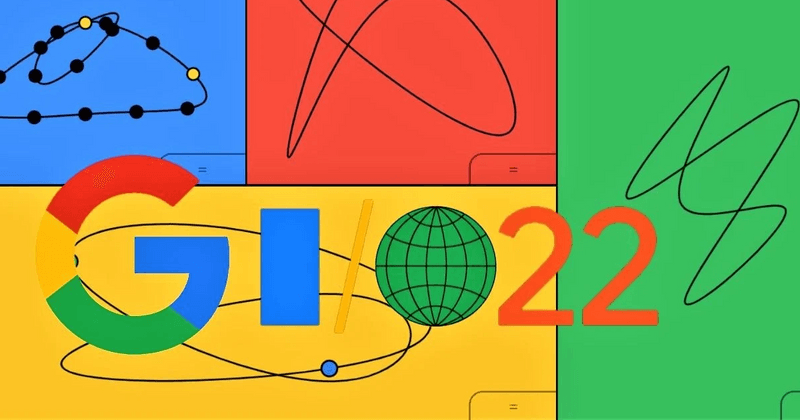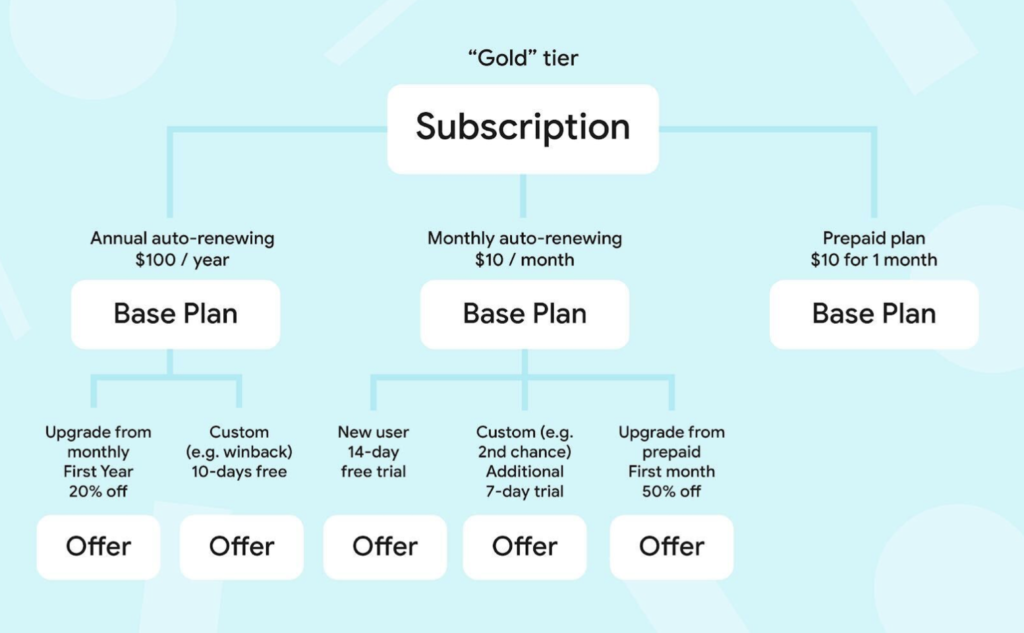Google I/O 2022 Announcements
How the new features and updated Play Console will help grow your app business


Maddie Beyl
Conference season is upon us, and Google I/O 2022 did not disappoint. Machine learning stole the show, with “AI” and “neural network” mentioned an estimated 3 million times during the two keynotes.
This year, however, was especially relevant for RevenueCat and our customers because Google announced a revamped subscription framework built to support more flexibility in in-app purchase tools.
Read on to learn about the new features, the updated Play Console, and how both can help you grow your subscription business.
New Subscription Model
Before getting into new features, let’s talk about the infrastructure that will support them – the new Subscription model. It might look familiar to RevenueCat customers.

At the highest level is the “subscription,” corresponding to an entitlement in the RevenueCat dashboard or a set of user benefits.
The next level is a “base plan,” defining the duration, price, and regional availability of a subscription. Base plans are the corollary to a RevenueCat product.
At the lowest level are “offers.” These are much more flexible than the previous free trial and intro prices, allowing you to specify pricing phases and to target more specific user segments.
The good news is that RevenueCat customers are shielded from understanding implementation details, and we’ll map these new concepts to our existing SDK API. However, since this announcement unlocks new configuration options, you’ll see a lot of changes in the Play Console.
Play Console – Before and After
Here’s the before-Google-I/O subscription setup in the Play Console:

The Play Console’s old subscription setup flow allowed for configuring only one billing period per subscription plus an optional free trial and intro price.
And the after:

The Play Console’s new subscription setup flow separates the benefits of a subscription from how they’re purchased, i.e. the billing period and offers.
You’ll notice that Google has automatically migrated any existing subscriptions to the new setup. The product ID is moved over to the new subscription, and a base plan has been created with the same billing period. Free trials and intro prices were also automatically converted into offers.
Those base plans and offers are marked with a “backwards compatible” badge, which means that they will continue to work as expected with the Billing Library version that the RevenueCat SDK interacts with.
New Features
If you dive deeper into the new console, you’ll notice more detailed configuration options that unlock some of the feature announcements from I/O. RevenueCat is actively researching how we can support these features in the future, and we’ll update this post and Twitter with that information soon.
Flexible Offers
The dashboard now offers more flexibility in creating offers for your subscriptions. There are more fine-tuned controls for eligibility criteria with the ability to define “phases” for your offers. These phases define a billing period, price, and recurrence, and as an ordered list, tell a “story” of the user’s subscription purchase journey.
Our team is researching how these new controls will interact with the existing RevenueCat SDK. In the meantime, we advise users to only edit migrated subscriptions in a backwards-compatible way.

Prepaid Plans
Support for prepaid plans was also announced, helping to expand your app’s market in regions where non-auto-renewing subscriptions are preferred. When a user purchases a prepaid plan, they pay for a single subscription period.
The subscription does not automatically renew – instead, the user can choose to “top up” their subscription by paying to extend their subscription for another duration period. As with the more flexible offers, stay tuned for more info on RevenueCat’s support of prepaid plans.
Read more in our blogpost on everything you need to know about Google Play Billing Library 5.
Other Announcements
Firebase Extension
Our new Firebase Extension was announced during the Developer Keynote!

The extension allows RevenueCat customers using Firebase to store purchase data with Firestore, Authenticate entitlements across platforms with Firebase Auth, track purchase events with Google Analytics, and more. Check out the recent blog post for more information.
Play Index
Google also announced the SDK Index featuring key information about SDKs registered with Google. This tool will be informative for app developers considering a new SDK integration or simply wanting to receive updates about the SDKs they’re already using. You can find data safety guidance, as well as information on version adoption and retention rates.
There is also an SDK-provider side to the Index, which allows our team to gain insights into crashes and better communicate with you about critical updates. Check out the purchases-android Play Index listing here.
Next Steps
Google I/O 2022 and WWDC are always exciting times for the development team here at RevenueCat.

The latest announcements present interesting challenges that reinvigorate our passion toward helping developers make more money. In the upcoming weeks, there will be a company-wide effort to research, test, and scope out support for features we think best serve our customers.
And if these announcements excite you too, we are hiring for RevenueCat engineering and beyond!
In-App Subscriptions Made Easy
See why thousands of the world's tops apps use RevenueCat to power in-app purchases, analyze subscription data, and grow revenue on iOS, Android, and the web.



